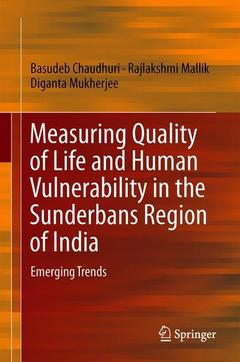Measuring Quality of Life and Human Vulnerability in the Sunderbans Region of India, 1st ed. 2024 Emerging Trends
Auteurs : Chaudhuri Basudeb, Mallik Rajlakshmi, Mukherjee Diganta

While there have been a large number of studies on the socio-economic aspects of physical quality of life in the Sunderbans, there are very few perception studies except at a basic level. The current volume has two major aspects. The first part contains a detailed study of overall demography and objective life condition which includes (a) quality and ownership of private goods ? equipment and machinery, livestock, house, land, consumer goods; (b) quality of public goods and amenities and their accessibility; (c) objective measures of relatively abstract factors related to social, political and familial environment such as quality of governance, extent of gender equality, social inclusion, social harmony, security, law and order, family bondings; (d) financial assets and indebtedness; (e) income and expenditure; (f) natural and man-made calamity, and; (g) vulnerability related to points (d), (e) and (f) above.
The second part comprises a detailed study of subjective life satisfaction, and value systems and priorities. The former refers to people?s perception regarding the various facets of their personal life - economic situation, standard of living, family and friends, work life and environment as also their perception about the well-being of the community. This refers to the overall social, business, and political environment such as social and help network, social inclusion, communal harmony, participation in civic and social activities, job opportunities and employment generation, government developmental project initiatives, disaster management initiatives, law and order etc. Value systems and priorities refer to individual rankings of the factors considered as necessary for personal happiness and for a happy society. It also includes their preferred rankings of government developmental initiatives and views regarding effectiveness and impact of such initiatives.Dr. Basudeb Chaudhuri, is a faculty at the Department of Economics, Management and Geography, University of Caen, Normandy, France, is on deputation as Scientific Advisor to the French Ministry of Higher Education, Research and Innovation. He has successively held the posts of Vice-President, University of Caen; Director, Centre de Sciences Humaines, New Delhi; National Coordinator, National Contact Point, Horizon 2020 Programme for Social Sciences and Humanities in France; Chargé de Mission, National Institute of Social Sciences and Humanities, CNRS; seconded National Expert of the French Government to the European Commission (Directorate General of Research and Innovation) for Economics, Social Sciences and Humanities.
Dr. Rajlakshmi Mallik is a senior development economist, avid researcher and an academician, with a rich experience of twenty two years. A PhD in Economics from Indian Statistical Institute (ISI) Kolkata, she has a long-standing interest and experience in policy-oriented development economics research on financial inclusion, higher education, empowerment, quality of life, sustainable development and vulnerability assessment. She also has extensive teaching experience in various Economics and Management programmes. As Technical Advisor of SSESS, Kolkata, she recently led and concluded a NITI Aayog, GoI project on Status of Women in Science among select institutions in India: Policy Implications. As Director of C-DRAṢṬᾹ which was founded in 2015, she is steering the non-profit research institution towards the realization of its mission of Observe, Reason and Empower. Currently she is leading a project on Sikkim's Green Vision: Strategies and Capacity Building funded by IPR Dept., Govt. of Sikkim, with focus on Green Tourism and Organic Farming. She has worked and has been associated with several institutions of repute in India and abroad. She has published in national and international peer reviewed
Discusses a micro- and quantitative study of perception and value systems
Covers a broad range of socio-economic aspects
Explores links between quality of life and vulnerability, both actual and perceived
Date de parution : 08-2024
Ouvrage de 240 p.
15.5x23.5 cm
Thèmes de Measuring Quality of Life and Human Vulnerability in the... :
Mots-clés :
Climate Change; Quality of Life; Sustainability; Value System; Vulnerability



